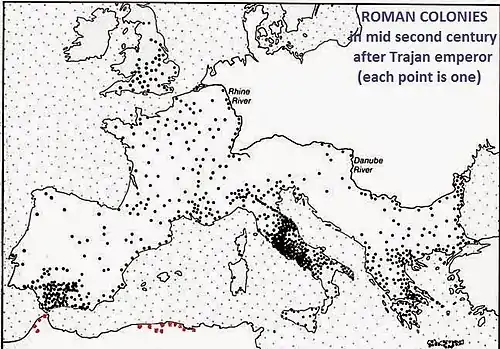Colonia (Roman)
A Roman colonia (plural coloniae) was originally a Roman outpost established in conquered territory to secure it. Eventually, however, the term came to denote the highest status of a Roman city.

It is also the origin of the modern term colony.
Characteristics
The Roman Republic, having no standing army, used to plant bodies of their own citizens in conquered towns as a kind of garrison. Initially these bodies would consist partly of Roman citizens, usually to the number of three hundred; but after Augustus the number was increased and thousands of Roman legionaries who retired from their legions were granted lands in many colonia in the empire.
In the first century of the Roman Empire the colonies were made only of "veterans" and were responsible for the Romanization of many territories (mainly in the spread of Latin language and of Roman laws and customs).
History
According to Livy, Rome's first colonies were established in about 752 BC at Antemnae and Crustumerium.[1]
Other early colonies were established at Signia in the 6th century BC, Velitrae and Norba in the 5th century BC, and Ostia, Antium, and Tarracina in the late 4th century. In this first period of colonization, which lasted down to the end of the Punic Wars, colonies were primarily military in purpose, being intended to defend Roman territory. There were colonies of citizens and colonies of Latins, which differed in size, constitution, and region. Colonies of citizens were typically coastal and known as coloniae maritimae. These were small (three hundred families), close to Rome, and enjoyed no civic life of their own. Sherwin-White suggested that they were similar to the Athenian cleruchy.[2] The Latin colonies (coloniae juris latini), on the other hand, were much larger and populated by Latins, as well as by Romans who, however, did not retain Roman citizenship. The first Latin colonies were initially founded by the Latin league. During the Late Republic, prominent figures such as the tribune Gaius Gracchus proposed to settle Rome's landless citizens in colonies of recently conquered provinces.[3] This concept, though popular and frequently reiterated by Roman contemporaries, failed to gain traction. Large scale settlement of landless Roman citizens in provinces would never really occur in the Roman Empire.
Under the Principate
Colonies were not founded on a large scale until the inception of the Principate. Augustus, who needed to settle over a hundred thousand of his veterans after the end of his civil wars, began a massive colony creation program throughout his empire. However, not all colonies were new cities. Many were created from already-occupied settlements and the process of colonization just expanded them. Some of these colonies would later grow into large cities (modern day Cologne was first founded as a Roman colony). During this time, provincial cities can gain the rank of colony, gaining certain rights and privileges.[4] After the era of the Severian emperors the new "colonies" were only cities that were granted a status (often of tax exemption) and in most cases during the Late Imperial times there was no more settlement of retired legionaries.
Effects and legacy of colonization
Roman colonies sometimes served as a potential reserve of veterans which can be called about during times of emergency. However, these colonies more importantly serve to produce future Roman citizens and therefore recruits to the Roman army.[4]
Roman colonies played a major role in the spread of the Latin language within the central and southern Italian peninsula during the early empire.[5] The colonies showed surrounding native populations an example of Roman life.[6]
Examples
See also
References
- Livy, Ab urbe condita, 1:11
- A.N. Sherwin-White, The Roman Citizenship, 86
- "Gaius Gracchus | Biography, Facts, Laws, & Significance". Encyclopedia Britannica. Retrieved 2018-07-02.
- Nigel., Rodgers (2006). Roman Empire. Dodge, Hazel. London: Lorenz Books. ISBN 0754816028. OCLC 62177842.
- "History of Europe - Romans". Encyclopedia Britannica. Retrieved 2018-07-03.
- "Colonia - Livius". www.livius.org. Retrieved 2018-07-02.
- "CHRONOLOGIE - Les grandes dates - Narbo Martius" (in French). Retrieved 4 February 2017.
- Procopius De Aedificiis 3.4.6-7
Further reading
- Bradley, Guy, and John-Paul Wilson, eds. 2006. Greek and Roman Colonization: Origins, Ideologies and Interactions. Swansea, UK: Classical Press of Wales.
- Broadhead, William. 2007. "Colonization, Land Distribution, and Veteran Settlement." In A Companion to the Roman Army. Edited by Paul Erdkamp, 148–163. Blackwell Companions to the Ancient World. Malden, MA: Blackwell.
- Crawford, Michael H. 2014. "The Roman History of Roman Colonisation." In The Roman Historical Tradition: Regal and Republican Rome. Oxford Readings in Classical Studies. Edited by James H. Richardson and Federico Santangelo. Oxford; New York: Oxford University Press.
- Curchin, Leonard A. 1991. Roman Spain: Conquest and Assimilation. London: Routledge.
- Fuhrmann, Christopher J. 2012. Policing the Roman Empire: Soldiers, Administration, and Public Order. Oxford and New York: Oxford Univ. Press.
- Salmon, Edward T. 1955. "Roman Expansion and Roman Colonization in Italy." Phoenix 9.2: 63–75.
- Stek, Tesse D. and Gert-Jan Burgers eds. 2015. The Impact of Rome on Cult Places and Religious Practices in Ancient Italy. Bulletin of the Institute of Classical Studies Supplement 132. London: Institute of Classical Studies, University of London.
- Sears, Gareth. 2011. The Cities of Roman Africa. Stroud, UK: History Press.
- Termeer, Marleen K. 2010. "Early Colonies in Latium (ca 534–338 BC): A Reconsideration of Current Images and the Archaeological Evidence." Bulletin Antieke Beschaving 85:43–58.
- Woolf, Greg. 1998. Becoming Roman: The Origins of Provincial Civilization in Gaul. Oxford: Oxford Univ. Press.
External links
| Library resources about Colonization in the Roman Empire |
- Jona Lendering, “Coloniae”, Livius.org (2006)
- L. Adkins and R.A. Adkins, “Coloniae”, in L. Adkins and R.A. Adkins, Handbook to Life in Ancient Rome, New York, 1994.
- M. Bunson, “colonies, Roman”, in M. Bunson, Encyclopedia of the Roman Empire, New York, 1994.
